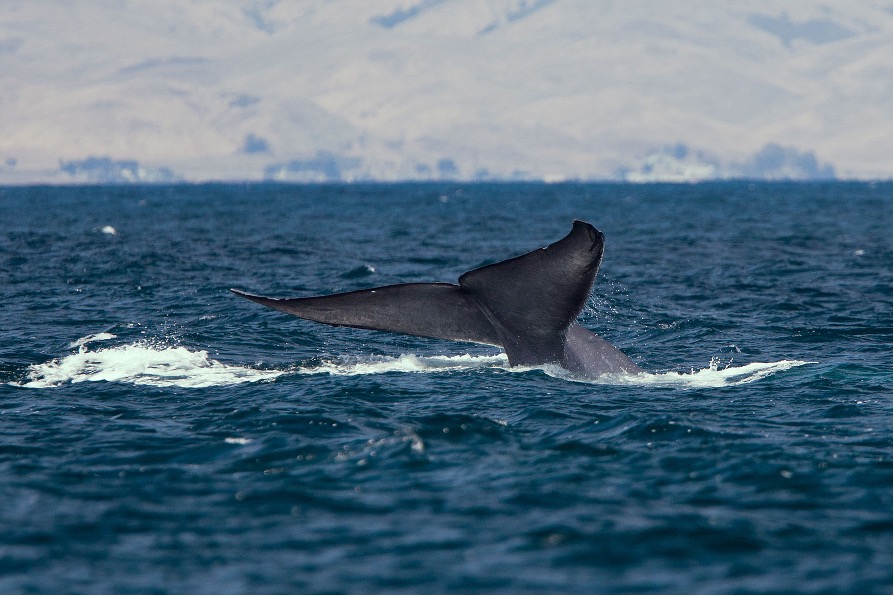
Figure 1: A blue whale’s fluke (tail fin) sticks out of the water as the whale dives, likely foraging. Stanford researchers now believe that studying blue whale songs can contribute to research on whale foraging and migration patterns.
Source: Wikimedia Commons
Blue whales make annual migrations from foraging grounds in polar waters to warmer breeding grounds near the Equator. A new study by Stanford researchers investigated how songs relate to migration in blue whales living in the Northeast Pacific Ocean (Kubota, 2020). These whale populations typically feed off the U.S. West Coast in the summer and spend winters near Mexico/Central America (NOAA, 2020).
William Oestreich and other researchers from Stanford University and the Monterey Bay Aquarium Research Institute (MBARI) recorded whale populations and individual whales using hydrophones (microphones that detect underwater sound waves) and tags attached to individual whales. The study found that blue whales’ migration and foraging activity can be inferred from the timing of whale songs. Blue whales tend to forage and feed throughout the day and only sing during the night. However, blue whales sing during the day when migrating. The connection between daytime singing and migration is of great interest to Oestreich and his colleagues, as daytime singing can provide data about migration timing and the locations of different whale pods during migration (Kubota, 2020). It should be noted that while only male blue whales produce the studied songs, the researchers suggest that the songs can track entire populations because male and female blue whales synchronize their migration departures (Oestreich et al., 2020).
The knowledge that daytime singing indicates blue whale migration will help scientists discern when blue whales are on the move. This information is useful for several reasons. Vessel strikes and entanglement in fishing gear are two deadly threats humans pose to blue whales (NOAA, 2020). Additionally, the ocean noise resulting from air guns, ship sonar, and oil tanker traffic can be incredibly harmful to blue whale populations, causing hearing impairment, brain hemorrhaging, and even death (Robbins, 2019). Tracking blue whale migration through song could allow scientists to warn boaters, fishermen, and shipping vessels when blue whales are migrating through an area, reducing the risk of any human-perpetrated damage to the whale populations. This is especially important because blue whales are critically endangered (meaning they are at an extremely high risk of extinction in the wild), so reducing human interaction with them could prove essential to protecting the remaining populations. The song-migration correlation in blue whales might also be useful in studying how migration patterns are impacted by climate change and local changes to the environment (Kubota, 2020). Tracking blue whale songs could allow scientists to observe whether shifts in migration timing and pathways correlate with regional changes in pollution and temperature.
References
Kubota, T. (2020). Blue whales switch to daytime singing before migrating. ScienceDaily. Retrieved October 11, 2020 from www.sciencedaily.com/releases/2020/ 10/201001113632.htm
National Oceanic and Atmospheric Administration (NOAA). (2020). Blue Whale. NOAA Fisheries. Retrieved October 15, 2020 from https://www.fisheries.noaa.gov/species/blue-whale#overview
Oestreich, W. K., Fahlbusch, J. A., Cade, D. E., Calambokidis, J., Margolina, T., Joseph, J., Friedlaender, A. S., McKenna, M. F., Stimpert, A. K., Southall, B. L., Goldbogen, J. A., & Ryan, J. P. (2020). Animal-Borne Metrics Enable Acoustic Detection of Blue Whale Migration. ScienceDirect. Retrieved October 15, 2020 from https://www.sciencedirect.com/ science/article/pii/S0960982220313312?via%3Dihub
Robbins, J. (2019). Oceans Are Getting Louder, Posing Potential Threats to Marine Life. The New York Times. Retrieved October 20, 2020 from https://www.nytimes.com/2019/01/22/science/oceans-whales-noise-offshore-drilling.html
Related Posts
Health Literacy in the United States
This publication is in proud partnership with Project UNITY’s Catalyst...
Read MoreGeopolymer Cement: Upscaling Industrial Waste into Sustainable Alternatives to Portland Cement
Figure 1: Aerial view of the 1.1 billion gallons of...
Read MoreCaroline Conway



